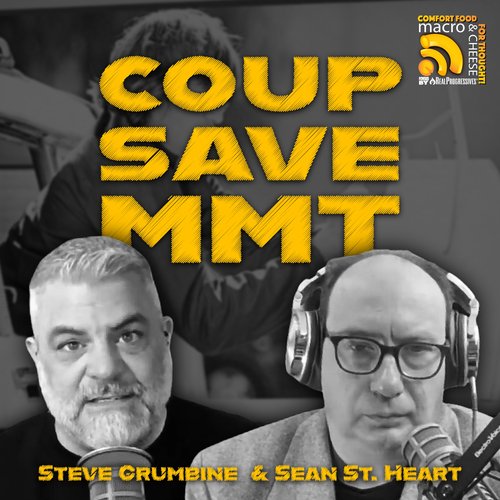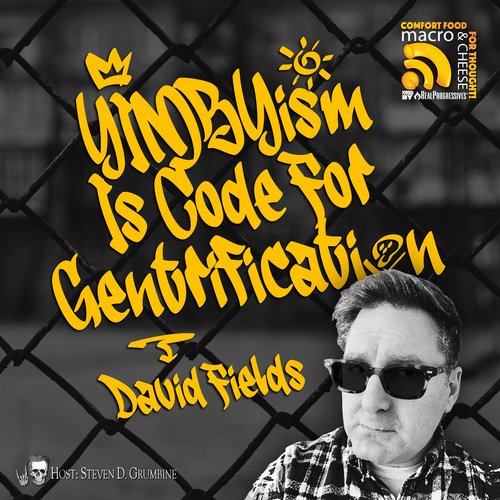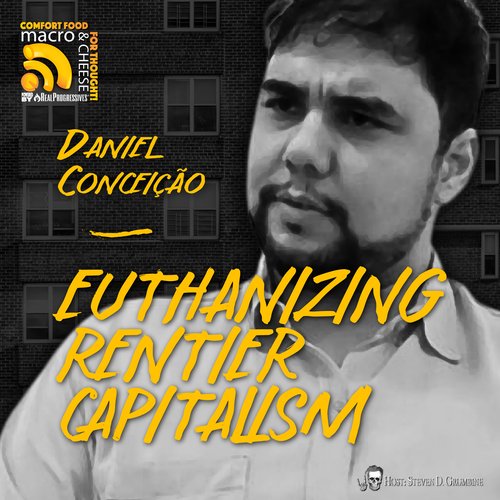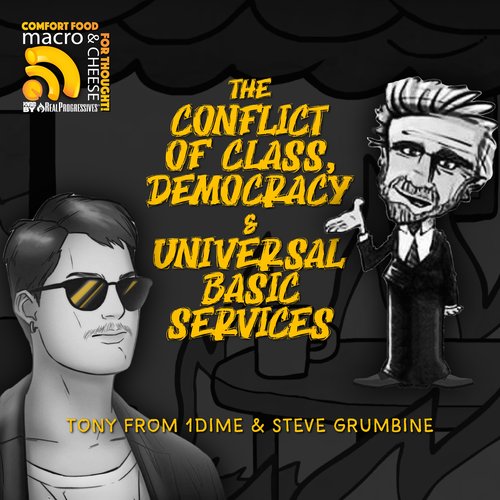Episode 41 – Demand Congress Serve the People with Brad Voracek
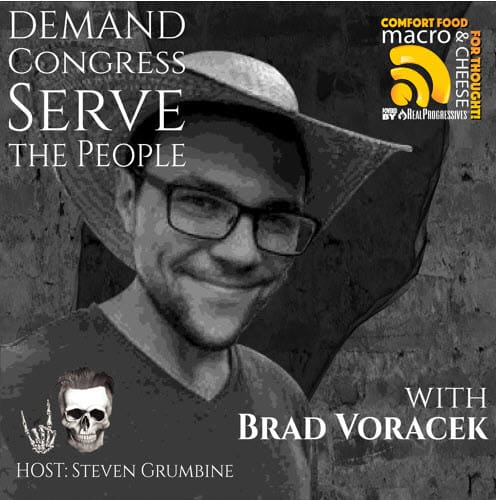
FOLLOW THE SHOW
Instead of universal basic income, let’s consider universal basic needs. Join us with special guest Brad Voracek
This 2017 interview features a younger Steve Grumbine speaking with a younger-still Brad Voracek. Brad was in the first graduating class of the masters’ program at the Levy Economics Institute of Bard College. His real-world experience as a teacher and mentor in Arizona is vastly different from Steve’s, a father of nine in Pennsylvania, who has had to cope with the medical challenges and expenses faced by his late father — and now, his own.
It’s refreshing to hear a young person explain how MMT makes sense based on his own observations and point of view. Rather than engaging in arguments about politics and economics, Brad tells us that he approaches each issue with simple questions: what is our purpose/what do we want? In his view, rather than battling over a basic income, let’s determine how to meet people’s basic needs — after all, we already know how to pay for it.
Steve and Brad take the discussion of a job guarantee away from the usual talk of a transitional buffer stock of labor and delve instead into a broader range of human values. In redefining work we can find a kind of fulfillment that we don’t always associate with minimum wage jobs. Whether we find that fulfillment in creative fields, caring for the vulnerable, or public service in general, the possibilities are endless.
Brad is less riled by anti-MMT cynics than some of our older colleagues. This may be because of his early exposure to the concept of sectoral balances. It boils down to basic double-entry accounting; a debit on one side is a credit on the other. It’s always a two-sided transaction between humans. A government deficit means a private surplus.
Join us for this intergenerational conversation. You might see something in a whole new light!
Brad Voracek got his master’s degree at the Levy Economics Institute of Bard College. In 2017 he worked in AmeriCorps VISTA, observing how direct job creation programs work in practice. Now he is a high school teacher at Phoenix Coding Academy and lead mentor for the robotics team.
@bradvoracek on Twitter
Macro N Cheese – Episode 41
Demand Congress Serve the People with Brad Voracek
November 9, 2019
Brad Voracek [intro/music] (00:03):
I think it makes sense to me that everyone willing and able should be able to find a job – like that doesn’t seem like something unreasonable to ask for it or something unreasonable demand.
Brad Voracek [intro/music] (00:17):
All the volunteers could be earning a job guarantee, wage. Amen. I agree with that wholeheartedly that there’s so many volunteers and all we need, give those people some money so that there is a way to give back to your community and make a little money so that you can survive.
Geoff Ginter [intro/music] (00:40):
Now let’s see if we can avoid the apocalypse altogether. Here’s another episode of Macro N Cheese with your host, Steve Grumbine.
Steve Grumbine (01:34):
This is Steve with Real Progressives. I have a real honor. Gentlemen that I’ve been chatting back and forth with for some time, and he’s a writer. He’s a tech wiz, he’s also a graduate of the Levy Institute at Bard College, a new program for economics. Gentleman’s name is Brad Voracek. And for those of you who follow Real Progressives and understand how important Modern Monetary Theory is to getting anything done, by the way, Brad is a great writer and his focus is largely on getting knowledge and information out to the public.
So, without further ado, I’d like to bring on this young man to let you see that this is the broad reaching movement, if you will, and it’s not really a movement. We’re just people that have come into agreement with the fact that reality is good enough for us. So with that, welcome to the show, Brad.
Brad Voracek (02:34):
Thanks for having me, Steve. I’m happy to be here and happy that we’re able to talk about these ideas on a platform like this.
Steve Grumbine (02:42):
Awesome. Alright, so do me a favor. Tell me a little bit about yourself. Tell our audience a little bit about yourself.
Brad Voracek (02:50):
I grew up in Southern California and my dad was an aerospace engineer and worked at NASA. You know, growing up, I heard about trickle down economics at some point, like, I don’t know. I remember being a young kid and questioning and looking up at my dad, like, is that really how it works? And we’ll get back to that later.
But eventually I strongly disagree that, you know, giving the rich people more money is not going to lift us all up. And so I went to UC Berkeley, studied computer science there. Occupy Wall Street happened around my junior year, and so I kind of got interested in these ideas of how the economy works, what can cause a recession to happen?
And I’m an investigative kind of guy. I kind of, I look at data a lot. I like researching this stuff. And so I had the question, well, how can we get a recession? What causes people to lose jobs? What causes people to, you know, in Berkeley, there’s a lot of homeless people. Why are people homeless?
You kind of start to ask those questions when you’re in this environment where everyone’s scared and it’s recessionary. And so I started digging into some blogs, reading the internet, reading some papers. And I discovered this Cullen Roche guy from Pragmatic Capitalism. And he kind of talked about some good stuff.
And he pointed me to the Wynne Godley and Marc Lavoie, monetary economics book, and reading about looking at balance sheets. And it was very different than what people were learning, the friends I had who were economists, what they were learning in their econ classes, which was mostly this math, calculus, taking derivatives, Kuhn Tucker Theorems, which I learned in the math department at UC Berkeley.
And it’s actually the Karush-Kuhn-Tucker Theorem. And it’s really interesting how there was this whole different economics department learning like similar math, but in a very different style and saying, this was the reality of the world without looking at if the models were actually useful. And then, you know, the sectoral balances graph, which you’ve seen and shared many times.
Every time we paid down that federal debt, we start paying it down and reducing our deficits. Then we got a recession and that looked pretty clear to me on the graph. You can see it every time we start paying it down right afterwards, there’s a recession. And so I’m like I got to study this more. I found out Wynne Godley passed away at the Levy Institute, along with Hyman Minsky, who I didn’t know about it when I applied, but has come to be one of my economists that I idolized.
And I went to school at the Levy Institute and learned a lot more about it. And it’s been great and interesting to learn about. And it seems like it’s just data, which in this world, I don’t even know if we care about data and facts anymore, but I do.
Steve Grumbine (05:37):
Well. I’ll tell you right now, and I’m not gonna pull any punches. The movement that I represent, the movement, and I’m a member of, and I’m a family member of within the progressive community is unfortunately big on joining things, but not big on learning things. They’re not big on learning how to make policy happen.
And so we’re in this awful, awful, awful situation. And you and I talked off camera a little bit about this. There’s an article by one of my favorite writers over there at New Economic Perspectives, JD Alt, and JD all has done “Millennials Money,” done some great videos for Dollars and Diagrams (DIAGRAMS & DOLLARS: Modern Money Illustrated).
But he did one particular slam dunk article that is must read for everybody called ‘The Oppressive Free Lunch.’ And what it talks about is how Paul Ryan and the GOP and the rest of the Ayn Rand lovers are out there actively trying to make us feel guilty for receiving any kind of public services, for even needing a government.
They’re basically acting like somehow or another, it’s demeaning to mankind to receive this. And then he sat down and he the broke down all the great sensibilities that all the progressives all share, even the ones on the Democratic Party who ended up doing horrible things. Even they, to a fault, will check the boxes for the sensibilities.
Yeah. We should never let the poor suffer. Yeah, we should fix the environment. Yeah, we should make college . . . . this, that, and the other right. One by one by one, they all check it off. But then he gets to the bottom and he says, however, none of them can answer the one question that prevents the progressive community from ever being anything more than a squeaky toy.
How are you going to pay for it? And on my life, the progressive community would rather sit there and just stay angry, stay in the struggle, then actually do anything meaningful to pay for these great ideas. They are more than content staying stuck in the struggle. What are your thoughts on that, Brad?
Brad Voracek (07:52):
Sure, well, my dad’s was pretty conservative and I grew up in red kind of neighborhood. And so the, “how do you going to pay for it?” – that fearmongering was very prevalent in the community I grew up in and you know, in my perspective, I’m not afraid of the federal debt. I don’t understand why everyone’s so afraid of it because you know, I ask people, “What’s going to happen to your life.
What’s going to make your life worse off if we pay down the federal debt,” and they can’t answer, they really can’t answer. And so I think it is important. Understanding money is important and it’s complicated, but you know, I think you’re right in that if we just ignore, or we . . . for a while, like let’s suspend our disbelief and just say, “Okay, maybe we can produce money.
We can produce money. You know, the government makes money. And so we can find the money. We can mobilize our resources by just creating the money and directing it to people.” Cool things make awesome stuff. I mean, we do it for war all the time and I think we can do it for other things. We have unemployment.
There’s still people looking for work. I walked down the street. I talk to people who are looking for work, unemployed people on the street. And I think we can pay for it. We have the money. We make it.
Steve Grumbine (09:16):
That’s a great point, Brad. And you know, I think when you think about it, Ellis will tell you I’ve been saying it, repeating what the masters say that MMT is not a movement. MMT is not a philosophy. MMT is not, you know, some sort of theory to be debated and maybe, well, let’s meet in the middle. MMT is the description of what is.
To deny MMT is literally to deny reality. And I stand firmly on that. And for those that doubt this and stuff like that, but they’ll sit there and complain about the Federal Reserve. Prove it, show me all those things, right. They don’t understand. The Federal Reserve is merely a scorekeeper, digital keystrokes.
They’re not sitting there with piles of fat stacks, the Benjamins and stuff like that to dole out and give away. They are merely like the hub that sits there and creates deposits and removes deposits. They are not the creator of the US dollar. When we think about this, Congress writes a bill. Congress produces instructions.
Those instructions then are followed by the people that were created by Congress and they create deposits. And then the treasury does whatever it does — writing bills, writing checks, you know, doing whatever it does. This is not rocket science. You can get into all the machinations that they try and do beyond the Holy of Holies to try and keep the plebes, you know, ignorant like they did back from the old days with Catholicism stuff.
But the point is that today we’re peeling back the curtain, if you will. And we see that the emperor has no clothes. We know the truth and we’ve got enemies. Like the Pete Peterson Foundation, they talk about fix the debt. And I’m like, we’re not going to have a planet to live on if you don’t spend on green energy today.
But there is our movement. Once again, marching in place, arms pumping feverishly, fist in the air. The struggle is real, all this good stuff. And this is what I think is the real value in MMT to anybody that actually wants to embrace reality is this is how you get it done.
Brad Voracek (11:32):
Yeah. I mean, it seems like now it’s going to take an act of Congress to get the things we want done. And so, you know, rather than looking at how we’re going to pay for it, what do we want, first of all, that should be part of the discussion. And once we decide that, well, we need to demand Congress to give it to us.
That seems obvious. And I mean, the money system is complicated. Like banks can create money also, like they’d make loans which created deposits and maybe 80% of deposits in existence are that kind of money. But the government gives out bank charters. The government is the one who creates the laws that creates the structure that allows the banking system to create money that way.
And it’s a hard problem. And I encourage everyone to look at the balance sheets yourself. And I think you’ll see if you look at the balance sheets that MMT is the way the economy works. It’s the way the money system works. And so then if you’ve accepted that, if you accept that this is how it works, what’s the next question?
What are we going to demand from our Congress? And so in my master’s thesis, I looked at a policy called Employee Young Americans Now proposed by Bernie Sanders and John Conyers. And it doesn’t ask the question of how we’re going to pay for it. It just straight up says, we’re going to spend money to create jobs for disadvantaged youth.
And 10% of our disadvantaged youth would be able to get paying jobs if that bill passed. And what’s it take to get that bill passed? It doesn’t take finding money. It takes getting everyone to believe that Congress has power, Congress can serve the people. And we just need to demand that they do it.
Steve Grumbine (13:04):
Yeah, that’s beautiful Oh my God. Like if I could coin that in a meme, I would do it. I’ve been trying to explain it. They’re like, how is this even a policy? It’s a foundation. It is the most important truth because it’s like you can’t get green energy from the federal government because honest to God, the capitalists out there that are looking at ROI models of two years and less, I mean, they’re not even looking at two years anymore.
I think they shrunk it to 18 months. They’re looking at a return on investment right now. If they can’t get a stock thing for their wealthy financiers, then they’re not going to do it. So there’s a million great ideas that have maybe a five year ROI return on investment, folks, that it doesn’t fit into the company model.
So the only people that are not profit driven are the creators of the US dollar, and that is the federal government. So our federal government could easily, easily say, we’re going to convert to green energy today. Oh, Mr. car manufacturer, you’re saying you have a problem with it. Well, we want our kids to live.
We want them to be able to survive. We’re going to go ahead and subsidize converting your gas guzzling engine to some hydroelectric engine, whatever the means that makes the most sense. There are things that we could choose because I liken this, this way. I’ve been saying that the federal government’s money that it spends is not our tax dollars.
It’s our national treasures. This is our money. It’s not our tax dollars. It’s our money in terms of what do we want from society? What do we want with our country? What are our values? And right now, if you were to look at America and you were just to assess what our values are down at the very bottom will be healthcare.
And even below that would be human beings. At the top of the food chain would be mother of all bombs. Then you would have F-35 planes. Then you would have $500 hammers. Then you would have toilet seats with gold, you know, whatever, but human beings and our lives and our jobs and everything else will be way down on the bottom.
And folks take that because they believe that we’re broke. They believe that social security is broke. They believe all these things. And then when people have the audacity to ask me the pertinence of MMT in a progressive agenda or a progressive platform or progressive anything, I just say, “Wow, you know what?
I’ve got time. You tell me how we’re paying for it. You tell me how you’re paying for your national platform. If you can’t tell it to me, than I will have to tell you how it’s done.” It’s that simple, because I’m at a point now where I’ve got nine children, and nine kids they’re waiting to live. They’re not living the wait, and I’m telling you right now.
I want my kids to be able to survive. If I die tomorrow, I want to know that we planted the seeds, that they can have a progressive future. And right now I have not seen anything from the progressive community that tells me they are serious about the progressive platform at all. And our progressive community are literally holding us back, Brad.
Brad Voracek (16:30):
Well, you know, I’m a young guy. I’m only 26 and I’m pretty new to politics. I’ve spent most of my life in school, but you know, in my lifetime we’ve seen two iterations of figuring out how to organize. We had Occupy Wall Street, then young people, you know, we got out there and they said, we didn’t know why we were chanting, or we didn’t know what we were protesting.
And I could hear it — what we’re protesting. We want some decent healthcare. We want some decent jobs, but somehow they said, we didn’t know what we were doing. Okay. Well, here comes Bernie Sanders, our second iteration at organizing and we’re getting better. Like Bernie Sanders comes along and he says, these are the things we want.
And you know, most people agree with those things. And, but everyone’s like, we can’t afford that. We can’t do that in our country. But everyone says, we’re the richest country in the world. And we can’t afford these things. It just seems like malarkey. And that’s like a kind of surface level, but then you dig it down into the details. And then even at the detailed level, it seems like that’s the case. We can’t afford to do these things.
Steve Grumbine (17:30):
Obviously you were interested in the Bernie Sanders campaign and you obviously know that Bernie surrounded himself with Modern Monetary theorists, like Stephanie Kelton, William Black. I believe Randy Wray was involved. James Galbraith and a number of others were involved as well, even in the background supporting it.
But yet here we are. Do you know how many of the progressives in our community have no idea who Stephanie Kelton is? I’m not even joking. She spoke at the People’s Summit last year. They don’t have any clue about what it takes to actually make federal government spend on the public purpose. And that’s another term they don’t have any understanding of.
What is the public purpose? They don’t understand that either. Can you talk a little bit about what the public purposes from your days are? Cause I know you were with Pavlina and L Randall Wray, and those are two individuals in particular that I know are very, very keen on the public purpose.
Brad Voracek (18:32):
Definitely. I mean, so Randy Wray was our professor in this program and Pavlina and Stephanie are people that we see at the Levy Conference. So the public purpose, I mean, I focus a lot on the job guarantee and jobs because I think that’s really a way that we can move this forward. We can change the definition of work.
We can create art. I’m living in a state right now. I’m in Arizona, there’s Democrats running on a policy platform of public education because public education has been dismantled. There’s vouchers for charter and private schools that regular citizens can’t afford. It’s ridiculous that a public education is the foundation of a policy platform for a politician in the world that I was born in.
Like, to me, it seems like the public purpose, while you know, you start with the public school, you get everyone an education. And education: you don’t have 40 students in a classroom. You need less than that. You need maybe 20. You talk to some teachers and they say, I can teach 20 kids, but 30, 40, this is impossible.
And then that goes to the question they ask, how do we get the money to pay for public schools? How do we double the number of teachers so that we can reduce class sizes? How do we build this infrastructure? And we demand it and we do it.
Steve Grumbine (19:52):
Amen brother. Let’s take that step further cause you’re talking about something entirely appropriate and mind boggling for most people. Take a moment and explain the difference between a state and the federal government in terms of how they view money, how they enact policy and why States are so constrained, whereas, the federal government really is not.
Brad Voracek (20:22):
Yeah, I mean, the phrasing kind of is that a state is the currency user and the federal government is the currency issuer. So at a state level, the federal government serves as this massive redistribution pool. So like you have some states that collect a lot more in state taxes. And then there are some states which run deficits at the state level and the federal government serves to move this money between states and serves as the bigger connecting piece between us all.
I mean, a state budget only controls a certain proportion of public education. And most of the budget comes from the federal government. So in some ways it has to be done on the federal level, but we have a lot of states who think that they can do it on their own. And maybe there are ways to like North Dakota has a public bank and I’m not an expert in this area, but it certainly seems like North Dakota fared better in the most recent recession pretty well.
And their students are in less debt because this public bank kind of serves a purpose, but I don’t know how that whole public banking system fits in with the bigger picture, so to speak. And that’s something I’m interested in, something I’m trying to look into, but there are things we can do at the state level.
But honestly, I think based on how the money system works, we really do have to demand our federal representatives to be the ones who champion our causes because at a state level, there are a lot more constraints than on the federal level it seems like. Even on the federal level, you get into big multinational corporations and it’s not easy. I don’t think it’s easy, but I think we’re moving in the right direction with MMT.
Intermission (22:15):
You are listening to Macro N Cheese, a podcast brought to you by Real Progressives, a nonprofit organization dedicated to teaching the masses about MMT or modern monetary theory. Please help our efforts and become a monthly donor at PayPal or Patreon, like and follow our pages on Facebook and YouTube and follow us on Periscope, Twitter and Instagram.
Steve Grumbine (23:03):
So let me ask you a question, Brad, because you’ve sent me some really cool models that you’ve done and stuff like that. And I believe it was regarding sectoral balances, correct? So, to me, and I’m going to give you my 2 cents, but I want to hear from you. You nailed it earlier. Everybody that is remotely economically literate has seen that graph of the foreign sector, the public sector and the private sector, and can clearly see every time we “reduced the deficit,” we end up with a recession.
It’s just like . . .And every time we’ve tried to pay down the debt with sometimes even worse than depression. Sectoral balances are science. When you’re looking at currency analysis, it’s science. When you tell me, as I’m telling you this specifically, I’m breaking it down step by step. And you go, not just theorizing, this is not an issue of being tolerant of others.
This is not an issue of, you know what, everybody’s got an opinion, this is facts, and this is saving lives. How does this play into it? Talk about sectoral balances for us.
Brad Voracek (24:18):
Yeah, I mean, so like on my website, like you said, you pull the data from the federal government and you can look at how the sectoral balances work. So Minsky said, “Money is an IOU and anyone can make money. The trouble is getting it accepted.” And so we, as a society, have accepted the dollar bill as that piece of money, a bank deposit that you can get from an ATM, it’s a piece of paper.
And the thing is every time you get money. So there’s a thing called double entry accounting. And every time that you get some money, another person is losing some money. Or every time it’s recorded in two places at every time. And that’s what the sectoral balances are describing. So when the deficit is increased on the government’s balance sheet, it looks like a debt.
But on the other side of that, there’s the money that someone else is holding. So you have to look at both sides of the coin, so to speak, and people don’t do that. They just look at the big, scary federal debt clock. And they don’t understand the other side of that money because money is a two sided transaction between humans.
And so then when we look at the sectoral balances graph, you ask some questions. You’re like, wow, that’s how it works. How do I understand more? And then you can look at Wynne Godley’s book is amazing in this respect. And so one of the models, a little marble thing I run, I showed you is very similar to Wynne Godley’s first model in that book where there’s just the government, there’s no foreign sector, there’s no private sector.
It’s just the government making money and showing how the balance sheets would work and that type of society. And then he evolves throughout the book into different types of systems that have private sector debt, and that have other countries, not just the one government, there’s multiple governments.
But you know, you start at that very basic level of this is how a balance sheet works. This is how money works at a very basic level. And then you keep iterating until you get to the system we have today, which is very complex, but at the very root there’s the seed that it’s a balance sheet. And that’s how the money system works.
Steve Grumbine (26:26):
Here’s a question I have for you. Obviously we all are used to our own family, household budget. We’re all used to in some way, shape or form paying our bills, be it writing a check, which is just offering instructions to our bank or slicing a card, which has still yet again, an electronic version of giving instructions to a bank.
And neither time do you have cash in hand. I mean, we’re talking about most of our dollars are digital in nature. I consider paper money, almost like . . . You’re data guy. You’re a network guy to think about this for a minute, right? If you go back to old fast packet technology, you buy ATM or frame relay services, you would have permanent virtual circuits running across them.
And you would say, okay, we’ve only got 1.5, four, four megabits per second on this C-1, but I can oversubscribe that because I know we’re only going to use this much of it at any given time. So you might have a DS three worth of data lined up to it, but only going down to a T anyway. The point is, is that I consider the cash merely like a representation of, you know, in play dollars.
And as soon as you put it back in, it’s all digital once again. These are like coupons that float around. I think people confuse the idea of paper dollars as the only form of money there is. And they don’t realize that it’s only a minor representation of the whole.
Brad Voracek (27:54):
Yeah, I think cash is something like 5% of the whole money. Most of it is sitting in banks as bank deposits, like you said, but the thing is that those bank deposits are redeemable for cash. And so that’s the thing that you have to keep in mind. So that piece of paper does kind of represent that, that bank deposit in the system, and it is accounted for by the banks, all the dollar bills that are in existence, they’re accounted for.
Steve Grumbine (28:21):
When you say that 5% of the money in the US are paper, that means 95% of the dollars are never coined, never minted, never turned into paper. They’re just keystroke deposits. That’s what our financial system is made of. And the way I jokingly say it: “The USA will run out of dollars when the guy with the fingers at the keyboard finally wears them down to a nub, his nose can no longer hit the keys, and we’re out of keystrokes.
That’s how we run out of money.”
Brad Voracek (28:55):
Yeah. I mean, I think there is that big problem with people viewing the federal government budget as the same as the household budget. And it’s something that I don’t agree with. And I looked at the data to get to that conclusion. Then I encourage everyone to do it themselves because you can’t just trust us.
You can’t just say, “Oh, these guys know what they’re saying, cause they’re blah, blah, blah. Look at it yourself and come to your own conclusions.” But I think you’ll find if you look at it that the federal government’s budget shouldn’t be run like a household budget. And it’s a huge problem that we have to get over before we can make any progress. And that’s so frustrating to me.
Steve Grumbine (29:32):
It is. As I sit there and I wish the people would just do the research themselves, but here’s the problem. They don’t have enough time. They’re bored. It’s above their head. And they go back to what they know. People literally believe that we borrow US dollars from China. They don’t realize that China because the Fed is trying to defend a positive interest rate, sells these securities, sells these treasury bonds.
They buy them because “way” they want to save in US dollars. So there they are, they are saving in US dollars. Well, that’s the national treasure, that’s their national assets. All of a sudden that money’s in play. I mean, I don’t get it.
Brad Voracek (30:14):
It’s frustrating. But also at the same time, you know, you see some of our commentators want to talk about the basic income and job guarantees. And I think at some point we have to, you know, just stop getting frustrated and stop fighting the issue and move forward with the things we can do with MMT.
Because once you understand that, that’s how it works. And there’s so much you can do. There’s so much that we can do as a society that’s like really beautiful, but it just takes that understanding. And so, you know, like if we want to talk about the job guarantee or basic income, you know, those are things that we can do.
I think it makes sense to me that everyone willing and able should be able to find a job like that doesn’t seem like something unreasonable to ask for it or something unreasonable to demand. And you know, it’s going to mean some difficult things. Like we have people who can’t get through high school because they have to take care of a younger sibling.
And so we need programs for people who can’t make it through the school system, but they have to make some kind of money. You have to like make some money to get some food, to stay alive. And if those very basic necessities aren’t taken care of, then how do we expect people to be able to actually get an education, get a high skilled job, learn these things because there are people in our country, the richest country in the world, so to speak, who are struggling with these very basic necessities.
It seems absurd. And like, I’m a young guy looking at this and I don’t know. It just seems ridiculous.
Steve Grumbine (31:44):
You wrote a great article. It’s one of my favorite articles out there. And you basically said that the BIG and the JG are complimentary, not at each other’s throat and they work together, but I think it may have been you and I talking? I’ve been really hung up on the idea of a BNG, not a BI G the basic needs guarantee was that you?
Brad Voracek (32:10):
Yeah, I put that in there because yeah, like I think we were at least what I was reading in my kind of own echo chamber. You know, they were kind of this basic income job guarantee, fight, fight, fight. And it’s like, well, what is the purpose guys? Like, we have to get down to the root, what are we trying to solve?
We’re trying to make sure that anyone who is born into this country has decent food, decent healthcare, a place to live. And, you know, I think that’s the things we can guarantee to people; and how we do that, it’s going be a debate. It’s going to be problematic. And, you know, we have people with special needs – we’re going to have to work with them.
And maybe we can’t just expect everyone to be able to work at McDonald’s job, flipping burgers. Maybe that’s a little unrealistic at this point. Maybe we need to work with those people to figure out the types of jobs that they can do and the way they can find purpose in their life. And you know, it’s not as simple as saying, Oh, there’s a lot of talk about like, what kind of jobs are people gonna do?
You know, there’s no profitable jobs. There’s no good jobs for people to do if they don’t have any skills. When it’s like, well, you know, do you care about other people at all? Maybe we should just try and work with other people and try to understand how we can get them a life that is fulfilling and passionate and something they can feel happy.
You know, when they’re doing their day to day life. And you know, I’ve worked in a big business and I’ve talked to a lot of people who work in big corporations and there are people who don’t enjoy what they’re doing. They feel like they’re wasting their time and they’re pushing around. They’re sitting at a desk bored.
And like, that’s so sad for me. Like people sitting at a desk for eight hours a day for nothing to do. That’s not the world I want to live in. And so maybe we can reduce the working day more. There’s a lot of things that we can do, but we do as a general population. There’s these mental blocks that people have that we have to get past that they have to get past.
And so maybe if we’re the people who are already past these blocks, it’s our job to show them how beautiful the world can be. And if we just have the will to do it. And so, you know, I know you talked a lot about like unemployment and like people are dying. And I agree with you. Like in my master’s thesis, there’s these great articles by some great researchers who look at the link between unemployment and suicide rates and, you know, suicide kills more people than police violence in this country.
And not that that’s not an important issue, but you know, the big issues are health and mental health. And it’s something that we’re not prioritizing. Our budgets don’t reflect those values. We’re not funding them. And it doesn’t make sense.
Steve Grumbine (34:51):
Let me ask you a question. As we go through this and we look at the job guarantee as all of us on the MMT side of the world know, the job guarantee is kind of like the Valhalla of the whole, what would be the prescriptive side of MMT.
Brad Voracek (35:10):
Holy grail.
Steve Grumbine (35:10):
Exactly. And as you think about that, all of a sudden now, instead of a gold standard, it’s a people’s standard, right? We’ve pegged the economy to you and I. And so if they screw with you and I, they destroy the economy. And so we are now the people standard, the job standards, so to speak, and I’m going to take to task .
. . Look, I love Warren Mosler. Like, I mean, like father figure. I love the guy and I love Pavlina and I love Randy. And when I talk to them, I tremble even a little bit. I think so highly of these folks, but let me just tell you, as I talk with Ellis Winningham and Ellis is like my spirit brother, okay, in this whole thing.
We both have the same kick ya in the head kind of approach to this, but he’s got a far more expansive view of the job guarantee. And the way I look at it and I’ve come to believe that he’s right on this, because this eliminates the concept, in my opinion, it takes the wind right out of the sails of the big boats.
And it puts everything in perspective. Maslow’s hierarchy of needs. Self-actualization at the top. In my opinion, the redefinition of ‘what work is’ allows us all to pursue who and what we are – not just some transitional hey, let me go be a buffer stock for the private sector to hirer me out of. I’m looking at this more of, okay, I know it’s not going to make me a mint, but I can do what I want to do in a society that values more than just profit.
I can actually self-actualize. I can do something for my local community. I can do something at the local school. I can teach kids guitar. I can teach them a painting class. I can teach them to surf. I can even do Bush sculptures if I want with my, you know, whatever it is that I want to do. That’s my point.
And that to me is the essence of the job guarantee. And the next piece of this. And I see this is really, really, almost criminal that we have not been able to penetrate, you know, minority communities with this knowledge, because quite frankly, a lot of the minority communities that are impoverished in the inner cities and stuff like that, this stuff is like, “Hey man, it’s great that you’ve got the luxury to talk about that I’m trying to survive.”
And it’s like if you realize that we’re trying to help you survive, this is for everybody. This is colorblind. This is literally just right. And all of a sudden, the people in Flint, Michigan are no longer stuck drinking poison water. They can up and leave and go to Denver and drink Rocky mountain water, and smoke Rocky mountain high.
They can do whatever they want and know they have a job waiting for them the next day – federal job, right then, right there. And they are free to tell the capitalists and the renters, serve my needs, or be gone. Money doesn’t grow on rich people. Our government creates it. You guys lost the power. You no longer have power over my life. I’m going to live to my potential.
Brad Voracek (38:16):
I like what you said there about redefining work. And I think that’s very important because, you know, I see it in my day to day life that we have a huge sector of volunteers in our world and our economy in the United States. We have people who volunteer at homeless shelters, who volunteer at food banks, who volunteered picking up trash from streets.
And that is work. That’s hard work. I’ve done it. I’ve packed food boxes. That’s difficult stuff. It’s not simple, but somehow we don’t value it. We don’t pay people to do those jobs. And it doesn’t make, I’m going to keep saying it doesn’t make sense because I’m so flabbergasted here. But I think that .
. . we talked to a lot of people who think it does make sense to pay these people, you know, to pay volunteers who are packing food boxes for people who are hungry, you know, that is work. And that’s something we can pay people to do, if we have the will to do it. All the volunteers could be earning a job guarantee wage.
Amen. I agree with that wholeheartedly, that there’s so many volunteers and all we need . . . give those people some money so that there is a way to give back to your community and make a little money so that you can survive.
Steve Grumbine (39:26):
Well, let’s talk about that right there, because you obviously writing that article you wrote know that the pushback from the bigs is, “Hey, you’re making people do this.” No, it’s the voluntary program. You can choose not to participate. This is not, you know, forced labor. And this is not somehow or another, the prison system making license plates on your back for free kind of thing. Let’s spend a few minutes just debunking the false claims that the big folks put on to the job guarantee.
And so that we can show them that we’re compatible, compassionate and there need not be this fight instead of acting like what we’re saying is somehow or another a bastardized version of Calvinism, they can like literally understand that by pegging the economy to the job guarantee, it’s far more than just, here’s some money and here’s a job. It actually stabilizes the entire nation.
Brad Voracek (40:24):
Yeah. So I mean, the job guarantee, the big thing is that it’s anyone willing and able to work can find a job. And those are the key things you have to be willing to work. I personally don’t believe that you can sit around all day and do nothing. I’ve tried it, you get bored. I think that people do need to find some passion in their life if they want to have fulfilling lives.
And that’s what the job guarantee kind of enables, you know, willing and you’re able, and then we have, obviously there’s people who have disability or maybe can’t work some jobs. And so that’s where, you know, other forms of social support come into play. And I think that we do need to support people who can’t fully participate in some super crazy job that makes you a ton of money in the society we live in.
Steve Grumbine (41:16):
Absolutely. All right. So I lost my father and everything changed in that moment for me. I realized how temporary life is. Somehow or another, I was given a few gifts and I feel like if I’m not doing something 24 hours a day, I’m wasting. And I look at my kids and I look at the evil that’s going on in the world right now.
And then I look at the progressive leadership in America today. And I’m telling you right now, not one of them can actually pay for their plans. How can you follow a party that doesn’t have a cohesive, coherent economic strategy?
Brad Voracek (41:53):
I don’t think you can. I think, I don’t know what it’s going to take. I don’t know who’s going to be the ones to get it through to our politicians, but I’m trying to talk to mine about this stuff. I’m showing up to events. I’m trying to talk to people about these ideas. And I think that’s what we all have to do.
We all have to show everyone the sectoral balances graph with the recessions overlaid and say, “Explain this, explain this. How do you explain this? This is just data. This is just facts. Why does this happen? Should we be that afraid of the debt? Should we really be? Cause it doesn’t look like it.”
Steve Grumbine (42:24):
Talk to me a little bit about what changes you would do to the regulatory environment, because obviously Glass-Steagall was a big deal. The repeal of Glass-Steagall, the housing crash, all the CDOs and all the other shadow banking. You name it. I know you heard some of this stuff. Talk to me a little bit about MMTs play within that world. Is that something you feel you can talk to?
Brad Voracek (42:47):
You know, it’s complicated, but I think the system is working well. The people who are running it right now, it’s serving someone pretty well. I think. And so the question is, can we use that same system to serve all of us? And so far from my understanding, it seems like we can, it’s just going to be a lot of hard work.
And you know, it’s sad because it kind of makes sense in a way, why do you want to dismantle public education if understanding having a decent education leads you towards this kind of view, then you know, maybe you don’t want people to learn that. And that’s maybe a kind of conspiracy out there. It’s something that we need to think about.
I think, and looking at the school system is important because if you read the Econocracy Review that I did on the Minsky’s, you can see how this type of Econ 101 thinking pervades throughout everywhere. Anyone who goes to a big Harvard college has to take Econ 101. And the fact that that economics doesn’t describe reality; it certainly seems like having a lot of people out there who are in positions of power, thinking a certain way, definitely serves a certain population.
And if we can get people to think a different way than I think a different population can be served.
Steve Grumbine (44:03):
Well, I think about like this. I have something called psoriatic arthritis, and psoriatic arthritis is brutal for those people who have it, you know what I’m talking about. It’s an auto immune disorder. The shots that come with autoimmune disorder are outrageously expensive. I mean, stupid expense.
There’s some dialysis type things, Remicade, things like that that are like pre-chemo type therapies and things like that that are outrageously expensive. There are a lot of people like my father who, when he passed, he had something called progressive supranuclear palsy, which is something that like some less than one for some of the population has, and it’s so rare that it’s not going to make them any money.
So they don’t really care to do a whole lot of research. And there’s not a whole lot of treatment out there. And so you see all these things happening, right? You see the environment collapsing and so on and so forth. And people confuse capitalism with our money system and our monetary system can support socialism.
It can support capitalism, it can support communism. It could support some new thing that we don’t know of yet. Bottom line is it’s not the monetary system that is the problem. The problem is the execution and the powers that be leveraging it for their own whatever. And the fact is that, and I’ll use the Catholic thing again, Luther, Martin Luther back in the day, got tired of all the penances and all the fake stuff that the church started putting into effect to make money and to bilk people and so forth.
And so he pinned up his 99 thesis and basically turned the world on its head. And it was sacrilegious, etc. But the average person was not supposed to read the Bible. The average person wasn’t supposed to read the Bible all the way up into the 19 hundreds into the 20th century. So, and there’s still people that consider it something that the people shouldn’t read.
That’s the same way as with economics, largely, in that people have gotten to the point where they believe that that’s only something for them. All these mechanics and stuff like that are put there to confuse people and to allow others to make money. The reality is is that we are the ones cut out. I mean, you look at the wealth gap from like back in the seventies, the present, I mean, we’re talking about like a, like almost a vertical in terms of income inequality.
That is not the system, that is the people in charge pushing it. I mean, Milton Friedman was famous for saying, “Hey, basically no more fiscal policy. You can’t do that. We got to keep the money static. You guys go into debt. And when it’s a low time, and when it’s a high time, you pay off your debt. Everything will be fine then.”
Brad Voracek (46:56):
Yeah. I’m with you. I mean, money is the tool that we use to mobilize our resources. And we can do that. We can mobilize people in a lot of different ways to do a lot of different things. And the way we mobilize people right now is pretty sad. Let’s go back to the beginning. Like I said, my dad works in NASA.
You know, I’ve spent a lot of time around some really smart engineers and it’s really sad, but the cool projects that they want to do, can’t be done because someone can’t find the money. And everyone says like, “Oh, well, you know, like, look at how great our system is that we made the internet through a private corporation.”
But if you look at like the “Entrepreneurial State” by Mariana (Mazzucato), I forgot her last name. I’m sorry, but Entrepreneurial State, and you’ll see like innovation a lot of times has come from the government. It has come from mobilizing resources towards something that might not be profitable.
And that’s science, you know, you got to fail a lot of times, you’ve got to try a lot of different things that might not work. And if we’re stuck in this idea that everything we have to do in our world has to be profitable, then we’re going to be stuck. We’re not going to be able to do anything. And so we need to realize that we can use our money to mobilize our citizens to do awesome things. And that’s what we should do.
Steve Grumbine (48:15):
Amen. Brad, I would love for you to come back.
Brad Voracek (48:18):
Thanks for having me, man. This was fun.
Steve Grumbine (48:19):
Absolutely. Brad, you’re welcome back anytime, sir.
Brad Voracek (48:24):
You, too.
Steve Grumbine (48:24):
Alright, sir. Bye. Bye.
Ending Credits (48:32):
Macro N Cheese is produced by Andy Kennedy, descriptive writing by Virginia Cotts and promotional artwork by Mindy Donham. Macro N Cheese is publicly funded by our Real Progressives Patreon account. If you would like to donate to Macro N Cheese, please visit patreon.com/realprogressives.
Related Podcast Episodes
Related Articles

16 Reasons Matt Yglesias is Wrong about the Job Guarantee vs. Basic Income

The Oppressive Free Lunch
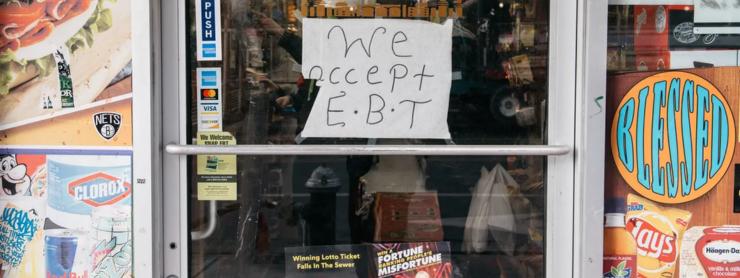
The Price of Hunger


